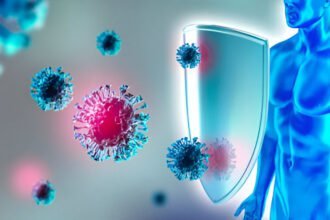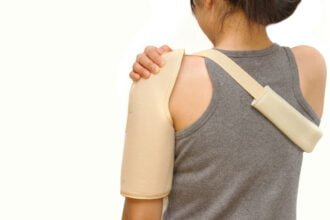Myth: Calories provide our energy
Myth: Calories provide our energy
Calories are not what provide the energy to fuel our body’s metabolism. Those are fueled at a cellular level by complex chemical reactions that obtain energy by breaking molecular bonds of chemicals like adenosine triphosphate. A calorie is not a biology/biochemistry term, but a term mechanical engineers first used and adopted by physics. The technical term of a calorie is this: one calorie is the amount of heat needed to heat one gram of water one degree Celsius. The calories we use are kilocalories – so multiply that by a thousand.
So calories don’t provide energy but are a measurement of the energy in a food.
Caloric History
Bridging physics to biology is largely credited to Wilber Olin Atwater (1844-1907), who applied the first law of thermodynamics to food: energy can be transformed, but it cannot be created or destroyed. With that he began the use of the term of calories to food – and started measuring how food affected people, by measuring their conversions of oxygen to carbon dioxide and the calories of food. Atwater concluded that people ate too many sweets and fats and didn’t exercise enough.
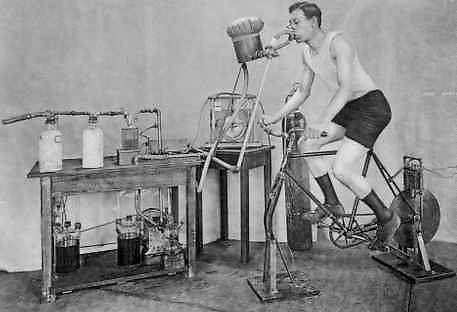
Using this equipment Atwater was able to determine the relative input of food and exercise
In the early years of determining calories they would put food into a machine called a “bomb calorimeter,” burn it, and see how much energy the food contained. This process has been refined, so that we know one gram of carbohydrates has four calories, one gram of protein has four calories, one gram of alcohol has seven calories, and one gram of fat has nine calories.
A calorie is a calorie
It doesn’t matter how many calories you consume, it matters what your body does with them. Your body will process those 100-calorie snacks differently from 100 calories of beef, or 100 calories of fish.
Fructose, in its refined form, is passively absorbed by the intestines and about 1/3 of it becomes fat. Doesn’t matter how much your body needs the fuel, one third of all fructose consumed is processed into fat.
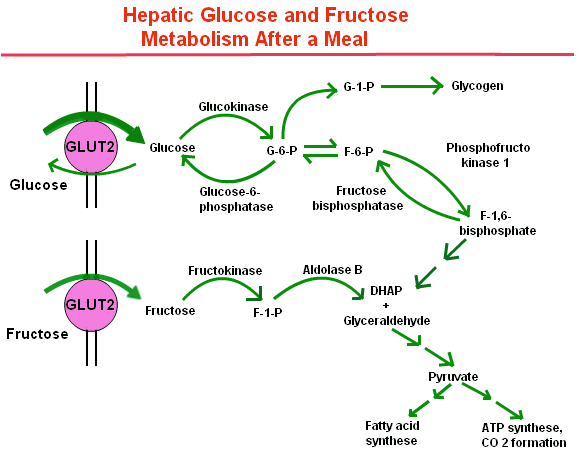
Graph from tutorvista.com showing the different pathways of glucose and fructose
Calories Don’t Matter if Your Body Can’t Use Them or Get to Them:
Your body actively absorbs glucose. As your body breaks down sugars and starches, when glucose is free the glucose is actively transported from the intestine to the bloodstream where it can be used as fuel. Every cell in your body needs glucose to function, from the brain to the muscles. Glucose is the currency your body uses to operate.
Fructose, in contrast, cannot be used by the human body as fuel. Fructose is passively absorbed in the intestines – which means if there is a lot of fructose present, it is absorbed into your bloodstream from the intestines. But that has to be pure fructose. Fructose in fruit, is complexed with the fiber, and the fiber cannot be absorbed – so you eat the 100 calories of fruit your body cannot absorb all the fructose. But drink 100 calories of juice, which is processed with a lot of free fructose, and chances are you will get all of the fructose and 1/3 will go down the fatty-acid pathway.
Common table sugar is made up of 1/2 fructose and 1/2 glucose. The high fructose corn syrup used to sweeten juices, soda, cookies, and many breads is higher in fructose than glucose. We recently wrote about the health risks of high fructose corn syrup.
The 100-calorie snacks are typically highly processed cookies, or snacks, and the processed sugar is broken down and quickly absorbed by the body and your body will store that excess as fat.
People cannot digest the cell walls of plants, like fruits and vegetables. This means humans cannot get at those calories without cooking or mechanically breaking down those cell walls. Raw foodies take advantage of this, unable to get most of the calories from vegetables and fruits; they are able to consume large amounts of calories and still lose weight.
Myth: Exercise burns calories
A patient came to me having gained a few pounds over a month and said, “I know for a fact that I exercise 1900 calories a day.” That is impressive, so I asked how he did it. He said that he used an elliptical machine for 45 minutes a day, and the calories he used were based on what the dials on the elliptical machine said. Funny thing – look at those machines or those iPhone apps and they tell you that you are burning hundreds of calories a day – but they are not only inaccurate, they are misleading.
The average male burns a bit over 2000 calories a day, and if you work out for an hour a day you will probably only burn another 100 calories in an hour. Discouraged? Don’t be. The majority of your calories are burned by your heart pumping, your lungs breathing, your brain thinking. Plus all those things you do during the day matter. The more involved you are in what you do, and increasing your activity, the better you will feel and the less likely you will be to waste calories on crummy food.
The easiest way to increase what you burn is to increase the things you do daily. Remember when you were a kid, and you were always on the go? It is time to get that spirit back- walk more, play more, have more fun- get out of that chair and off the couch. That will burn more exercise than going to the gym and watching your friends work out. You know that tiny lawn you have – get a push lawnmower and use that.
Exercise is good – it is empowering, it gets you out of the house. Get a Nike Fuelband or some monitor, and use it – plan to exceed your daily activity until you get to an average of 10,000 steps a day.
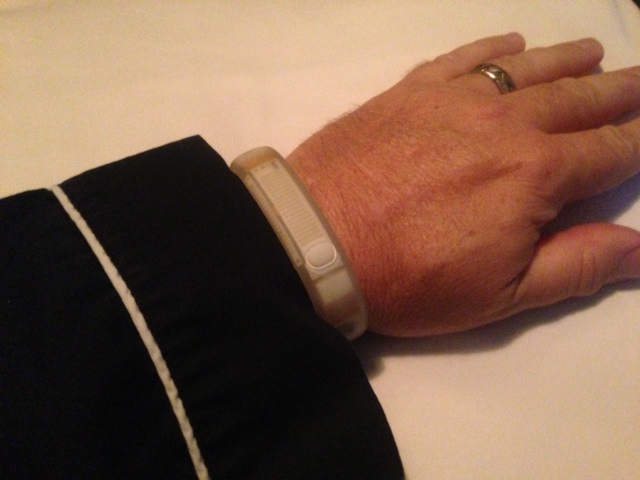
Just Do It
Myth: The reason you are not losing weight is you are not eating enough
Fred weighed 400 pounds, and he decided to get a Lap-Band to help him lose weight. He hit a plateau after 18 months when he weighed 250 pounds, so he asked me if he needed to eat more to lose weight. My answer is, “Yes, it needs to be more fruit and more vegetables – not processed. What it does not need to be is yogurt, cheese, or nuts.”
Fred was eating a lot less food, less than he had in years, but it was still enough to sustain his weight at 250 pounds (he wanted to get to 190 pounds). It was a combination of not just how much he ate, but also when he ate.
If you eat all of your calories at one time your body has to decide to do with the excess fuel. Does it store it, or does it burn it? Sometimes it isn’t that you are not eating enough – sometimes it is that you need to spread that same amount of calories throughout the day. We reported about that study here.
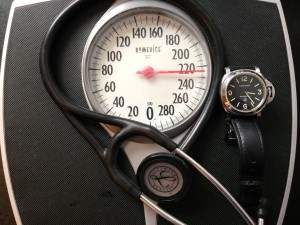
it isn’t just how much you eat – it is also when you eat and what you eat that determines your health
Myth: It isn’t the calories, it is the insulin response to calories
This popular theory goes like this: you eat too many carbohydrates, the insulin level spikes, stores that as fat while stimulating the fat to store yet more fat and drive a person to eat more simple carbohydrates. People who like the simplicity often pontificate that we should eat our calories from protein – be they Paleo, Atkins, low-carb types, or proponents of the glycemic index. People who previously ate a lot of processed food and move into more protein will lose weight – but the body isn’t just that simple.
But the body is even more complex than that – and measurements taken are not insulin levels, but often glucose levels in response to what is believed to be insulin.
Some people just are lucky
Did you ever meet someone who could eat huge amounts of food and never gain an ounce? They can eat junk food, or violate every “rule” and yet not gain a bit. They are just burners.
So they can consume 5000 calories and yet look great – while you have ice cream every night for a week and come away with an extra pound.
Think of people like cars. Some cars are very efficient at burning gas – the Toyota Prius, Honda Civic – they are like the skinny little friends who eat lots of junk food while looking slim. Some cars are gas-guzzlers – they are larger, don’t look as sleek – that is like many people. Both get the same amount of gasoline, but they use it differently.
Calories are Still Pretty Good
Overall, as we demonstrated with the beer and sausage diet as well as the eggs and beer diet – when you cut down on the number of calories you consume, you will lose weight. We have not found a way to replace how the energy in chemical bonds and people are pretty accurate.

A few simple rules:
Eat lots of fruit and vegetables.
Lean meats are just fine.
Make sure you have nutrient rich foods.
Increase your daily activity – walk more, get up more – use that nervous energy.
And if you think a lettuce wrap is better for you than bread – you are missing the point.
REFERENCES:
Here are some older references that I found:
Atwater, W. O. (1895). Methods and Results of Investigations on the Chemistry and Economy of Food. Bulletin 21, U.S. Department of Agriculture, Office of Experiment Stations, Government Printing Office, Washington, D.C.
Atwater, W. O., and Rosa, E. B. (1899). Description of a New Respiration Calorimeter and Experiments on the Conservation of Energy in the Human Body, Bulletin 63, U.S. Department of Agriculture, Office of Experiment Stations, Government Printing Office, Washington, D.C.
Atwater, W. O., and Benedict, F. G. (1905). A Respiration Calorimeter with Appliances for the Direct Determination of Oxygen, Carnegie Institute of Washington, Washington, D.C.






